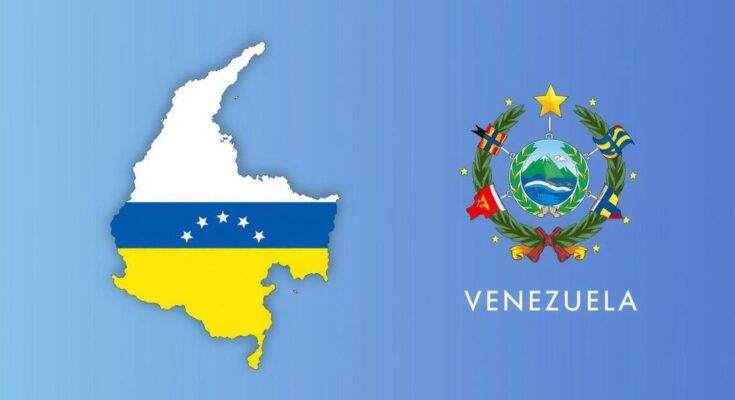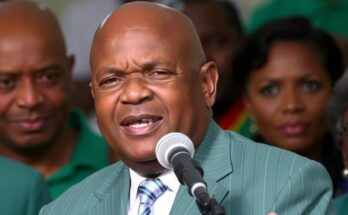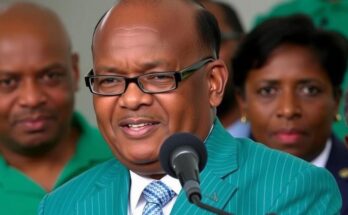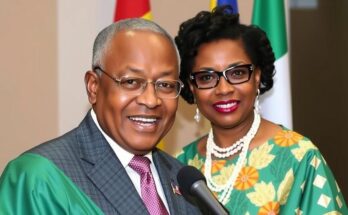Colombia has asserted it will not recognize Nicolás Maduro’s reelection unless Venezuela publishes voting records from the disputed July elections by January 10, 2025. The international community, including Brazil and several Latin American countries, has echoed calls for transparency, with significant allegations of electoral fraud stemming from the opposition. Colombian officials emphasize the necessity for clear electoral records as a requirement for legitimizing Maduro’s term amid escalating tensions and protests in Venezuela.
On Wednesday, Colombia reasserted its stance regarding the recent reelection of Venezuelan President Nicolás Maduro, stating that it will not recognize the election results unless the Venezuelan government discloses the voting records from the contested polls held earlier this year. Colombian authorities set a deadline for January 10, 2025, coinciding with the expiration of Maduro’s current term, demanding transparency in the electoral process as a prerequisite for recognizing the legitimacy of the election results. The election, which took place in July, has been marred by allegations of irregularities. Venezuela’s electoral authority, the National Electoral Council (CNE), loyal to Maduro, quickly announced his victory, claiming he received 52 percent of the votes. However, significant portions of the international community, including Colombia and Brazil, have stood opposed to accepting the legitimacy of Maduro’s reelection without a comprehensive vote breakdown, which Venezuelan law mandates but has yet to be provided. The opposition party in Venezuela has alleged electoral fraud and has highlighted its own tallies, claiming that their candidate, Edmundo Gonzalez Urrutia, won approximately two-thirds of the ballot. Conversely, the CNE maintains that the opposition achieved only 43 percent of the vote. Following the election, tensions escalated, resulting in a crackdown on protests, which has reportedly caused fatalities, injuries, and numerous arrests amidst widespread discontent. Colombian Foreign Minister Luis Gilberto Murillo emphasized that the Colombian government’s stance is unequivocal; the vote records must be disclosed prior to the end of Maduro’s term. Murillo stated, “The presentation of the (Venezuela voting) minutes must be made before the end of the current presidential term, on January 10, 2025. Otherwise, as Mr. President (Gustavo Petro) has already expressed, Colombia will not recognize the results announced by Venezuela’s electoral authority.” In response, Venezuelan Foreign Minister Yvan Gil criticized Murillo’s comments as politically motivated, asserting that they showcased his hesitance in private discussions while seeking to make a spectacle before the media. He threatened repercussions for Murillo’s comments regarding Venezuela’s internal matters, suggesting that diplomacy should not be conducted under pressure from external forces such as the United States. Several Latin American nations, including Argentina and Peru, have voiced their support for the opposition’s claims and have withheld recognition of Maduro’s electoral victory, reflecting a regional inclination favoring democratic norms and electoral integrity. As Colombia and other nations await Venezuela’s compliance with the demand for transparency, the future diplomatic relations between Colombia and Venezuela remain precarious, centering on the outcomes of the controversial electoral process.
The political landscape in Venezuela has been marked by severe tensions, especially regarding President Nicolás Maduro’s administration and its repeated claims of electoral legitimacy. International scrutiny has intensified around Venezuelan elections, particularly due to allegations of fraudulent practices and the lack of independent oversight. The mandates that require electoral authorities to publish comprehensive voting records serve as a fundamental principle for ensuring transparency and maintain public trust in democratic processes. Colombia’s position reflects not only its national interests but also wider regional concerns about democracy and governance in Latin America, where other countries are increasingly wary of Maduro’s regime. The fierceness of opposition protests in response to the elections and subsequent government crackdowns has further highlighted the political stakes involved as the region grapples with its democratic ideals.
In summary, Colombia’s demand for the release of voting records by Venezuela underscores its commitment to electoral integrity and democratic principles as rooted in accountability and transparency. The international community’s response to Maduro’s controversial reelection reflects broader concerns about governance in Venezuela. As tensions heighten, both nations face critical decisions regarding diplomatic relations that hinge on the forthcoming electoral disclosures. The outcome remains pivotal in shaping Colombia’s recognition of Maduro’s presidency amid rising tensions in the region.
Original Source: www.barrons.com




